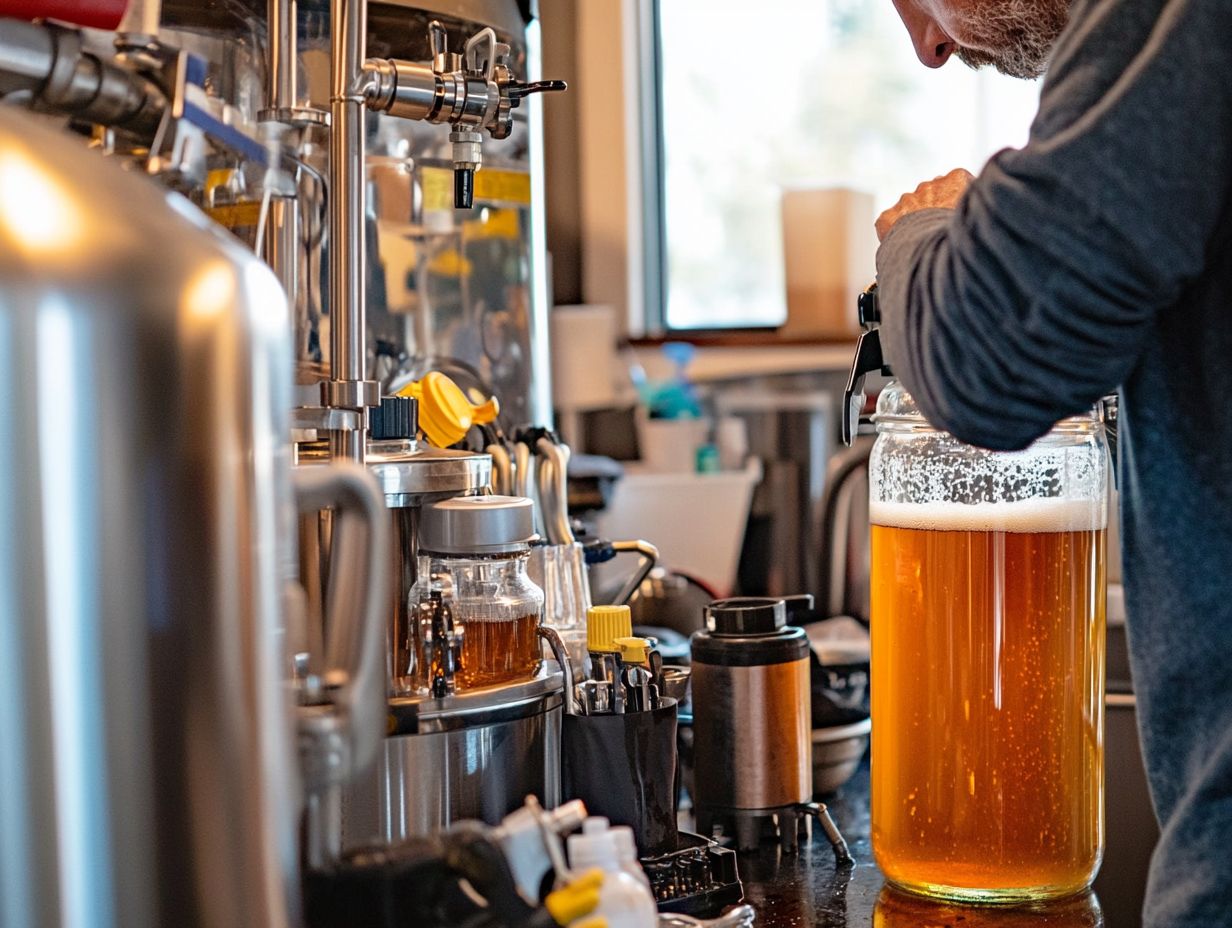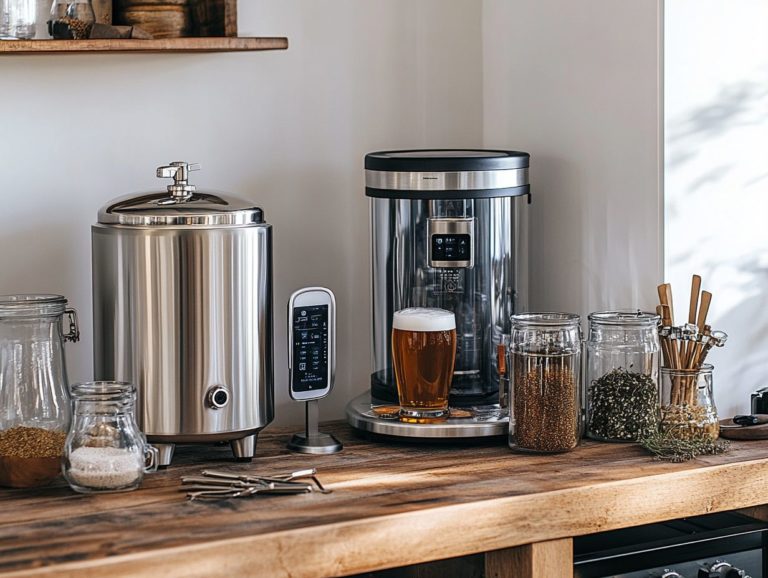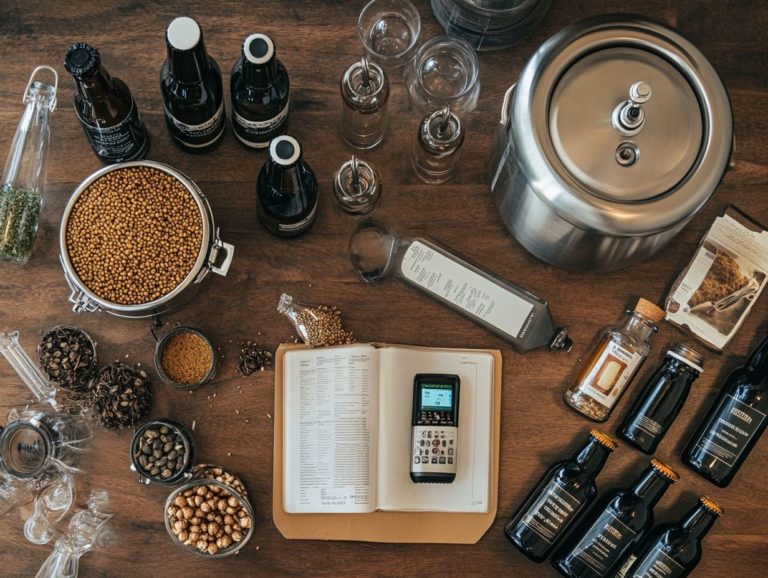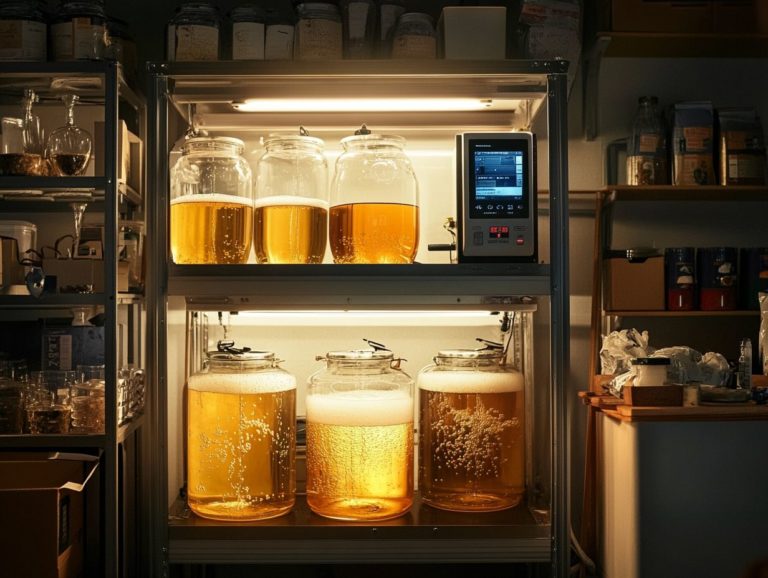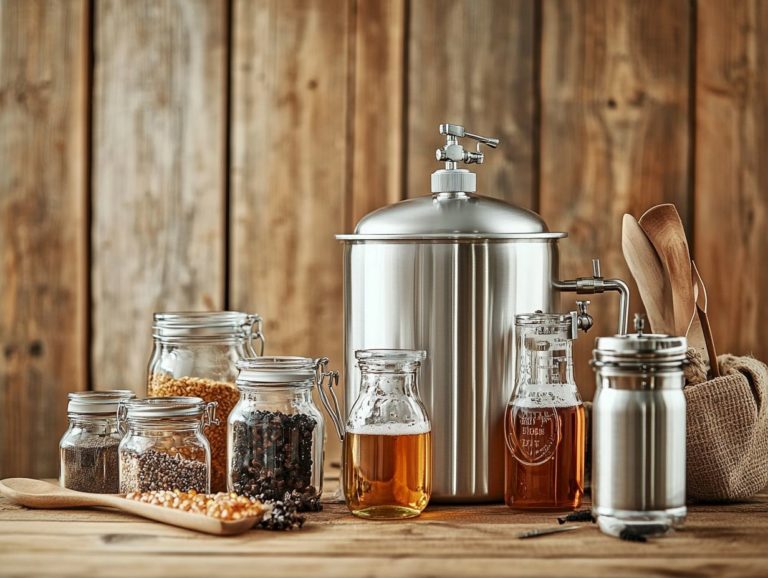A Guide to Home Brewing Equipment Maintenance
Home brewing is not just a hobby; it s a thrilling adventure that rewards your patience and creativity. However, to truly craft exceptional beer, maintaining your brewing equipment is paramount.
This guide will walk you through the essentials of home brewing equipment maintenance, highlighting its importance and the frequency with which you should perform upkeep. You ll learn everything from the best practices for cleaning equipment and sanitizing to the critical task of inspecting your gear for signs of wear and tear.
Additionally, you ll uncover common pitfalls that can arise from neglecting maintenance, along with practical tips to troubleshoot any issues that may occur. By staying diligent in your equipment care, you ll ensure that your brewing experience remains seamless and that your beer consistently impresses.
Contents
- Key Takeaways:
- What Is Home Brewing Equipment Maintenance?
- Why Is Home Brewing Equipment Maintenance Important?
- How Often Should You Do Home Brewing Equipment Maintenance?
- Basic Steps for Home Brewing Equipment Maintenance
- Essential Maintenance for Home Brewing Equipment
- What Are Some Common Issues That Can Arise If Home Brewing Equipment Is Not Maintained?
- How Can You Extend the Lifespan of Your Home Brewing Equipment?
- What Are Some Tips for Troubleshooting Home Brewing Equipment Issues?
- Frequently Asked Questions
- What is home brewing equipment maintenance?
- Why is home brewing equipment maintenance important?
- How often should I clean my home brewing equipment?
- What products should I use for cleaning my home brewing equipment?
- How do I properly sanitize my home brewing equipment?
- When should I replace my home brewing equipment?
Key Takeaways:
What Is Home Brewing Equipment Maintenance?
Home brewing equipment maintenance is essential for both amateur and professional brewers seeking to elevate their brewing experience. It involves a range of tasks, including cleaning your equipment, inspecting brewing tools, and adhering to established brewing standards and maintenance tips.
By prioritizing proper maintenance, you not only extend the lifespan of your brewing gear but also enhance the quality of the beer you produce. This process encompasses the upkeep of brewing kettles, fermentation tanks, and other vital tools, all aimed at ensuring the efficiency of your brewery and nurturing a vibrant brewing community. Engaging with brewing consultants for brewing guidance can also be highly beneficial.
Why Is Home Brewing Equipment Maintenance Important?
Maintaining your home brewing equipment is crucial for ensuring both the quality and safety of your brewing process. When this responsibility is neglected, you risk equipment malfunctions, contamination, and unwanted off-flavors in your beer, which can tarnish the reputation of your brewing endeavors. Proper brewing equipment inspection is vital to avoid these issues.
By prioritizing maintenance tasks, you can optimize your brewing operations, effectively manage brewing costs, and ensure compliance with brewing standards. All of these factors play a significant role in the overall success of your brewing projects.
How Often Should You Do Home Brewing Equipment Maintenance?
The frequency with which you maintain your home brewing equipment hinges on the scale of your brewing operation and how heavily you utilize your gear. A thoughtfully designed maintenance plan involves regular inspections of all your brewing equipment, from heat exchangers to electrical motors and pressure gauges, ensuring everything is operating at peak performance and following brewing safety standards.
For home brewers, adopting a proactive maintenance schedule enables you to catch potential issues before they escalate. Meanwhile, larger brewing businesses may necessitate more stringent maintenance routines to keep pace with their elevated production demands, including brewery maintenance and regular brewery equipment checks.
Grasping these factors is essential for extending the longevity and efficiency of your equipment, ensuring consistent and safe brewing results.
Factors That Affect Maintenance Frequency
Several factors influence how often you need to maintain your home brewing equipment, including your brewing process, the type of equipment you re using, and the scale of your production. If you have multiple brewing kettles, fermentation tanks, and complex cooling systems, you might find that your maintenance needs are more frequent compared to a basic home brewing setup.
Your cleaning practices and the level of expertise within the brewing community also determine how often you perform maintenance tasks. This ultimately affects the quality and safety of your brews. Consulting with brewing experts can provide additional insights to enhance your maintenance plan.
For instance, if you re using a straightforward five-gallon kettle, you might discover that weekly inspections are adequate, given the lower usage frequency and simpler brewing techniques you employ. On the other hand, if you re running a commercial brewery, you must adhere to strict brewing safety standards. This means daily equipment inspections are essential to prevent potential contamination or malfunction. Brewery maintenance in a commercial setting often involves checking packaging lines and other complex systems.
Environmental conditions are equally important. High humidity levels can accelerate corrosion in your equipment, prompting you to adjust your maintenance schedules accordingly. By grasping these factors, you can not only prolong the life of your equipment but also ensure that your brews are consistent and safe. Engaging in brewing improvements can further enhance your brewing quality.
Basic Steps for Home Brewing Equipment Maintenance
Proper maintenance of your home brewing equipment is crucial! It’s essential for achieving exceptional brewing results and ensuring safety throughout the brewing process, enhancing your overall brewing experience.
Key steps in this maintenance routine include:
- Thoroughly clean your equipment before each use,
- Meticulously sanitize all components with food-safe sanitizers, which kill harmful microbes,
- Inspect for any signs of wear and tear, and
- Replace parts as necessary.
By diligently following these practices, you can effectively prevent complications such as contamination and equipment malfunctions. This attention to detail not only enriches your brewing experience but also elevates the quality of the beer you produce, ensuring a seamless brewing process.
1. Cleaning
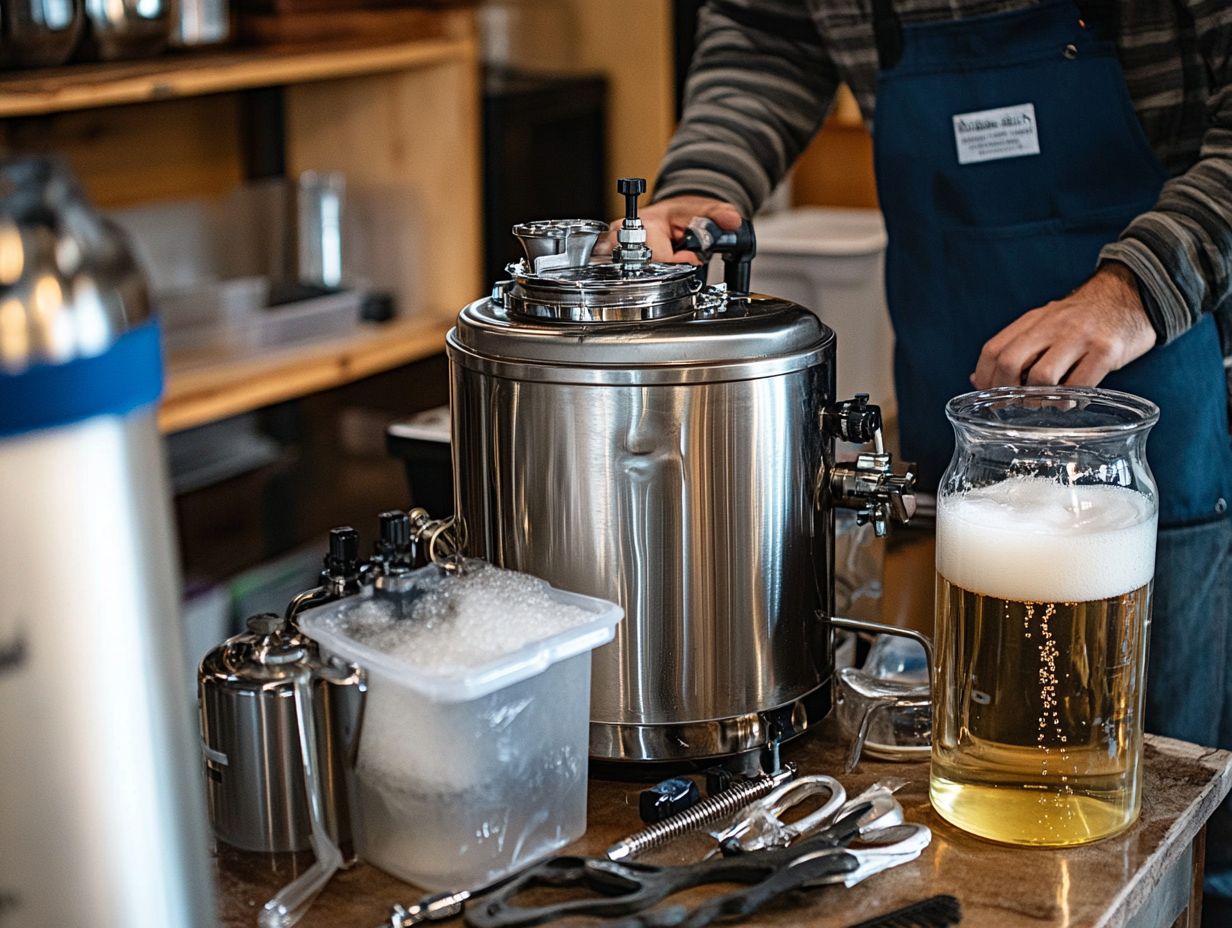
Cleaning is the essential first step in maintaining your home brewing equipment. It s vital for ensuring a successful brewing process. Regularly cleaning your brewing tools, such as fermentation tanks and brewing kettles, helps prevent contamination and off-flavors in your beer, which can significantly compromise your entire brewing experience.
Using proper cleaning equipment and techniques is key to maintaining high brewing standards. By implementing effective cleaning practices aligned with brewing standards, you maintain the integrity and safety of your brewing environment.
If you re truly passionate about brewing, using the right cleaning agents and techniques is essential. This means selecting food-safe sanitizers that effectively combat harmful microbes, and employing methods like soaking and scrubbing to thoroughly eliminate any residues. Additionally, preventive maintenance strategies can further safeguard your brewing environment.
Routine equipment inspection is another crucial aspect of keeping your brewing setup clean. It allows you to catch potential issues before they escalate. By adhering to these practices, you can enhance your brewing techniques and contribute to producing high-quality, safe beer, ultimately elevating the enjoyment for everyone involved. Effective brewing guidance can also play a vital role in maintaining a safe brewing operation.
Start your brewing journey today by following these essential maintenance tips!
Essential Maintenance for Home Brewing Equipment
2. Sanitizing
Sanitizing is an essential step in maintaining your home brewing equipment, following the cleaning process.
This involves applying sanitizers to your brewing tools and equipment to eliminate any lingering bacteria or contaminants that could compromise your brewing efforts. This step is crucial for maintaining high brewing quality and safety.
By ensuring that fermentation tanks, brewing kettles, and other utensils are properly sanitized, you can safeguard the quality of your beer and uphold stringent brewing safety standards. Adhering to brewing advice during this process is critical for achieving the best results.
You have a variety of sanitizing agents at your disposal, each with unique properties tailored for specific types of equipment. Solutions like iodine, peracetic acid, and chlorine dioxide are popular choices among home brewers, renowned for their effectiveness in obliterating unwanted microorganisms and maintaining the integrity of the brewing process.
It’s crucial to follow brewing advice regarding contact time and dilution ratios to achieve maximum efficacy. Contact time, the duration sanitizers should remain on the surface, is critical for effectiveness. By adhering to proper brewing standards during the sanitization process, you can significantly enhance your final product, resulting in a cleaner and more flavorful brew that will truly impress.
Are you ready to elevate your home brewing game? Partnering with YoLong Brewtech can provide innovative solutions for your brewing needs.
3. Inspecting for Wear and Tear
Inspecting for wear and tear is an essential maintenance task that helps your equipment last longer and work better. Regularly examining critical components such as pump connections, safety valves, and pressure gauges helps you spot potential issues before they develop into costly malfunctions.
Keep an eye on your electrical system and heat exchangers as well. Embracing maintenance tips and adhering to sound brewing practices helps you proactively tackle any signs of wear and guarantee optimal performance in your brewing operations.
Regular equipment inspection is crucial for the longevity of your brewing system. Look out for common signs of wear, like leaks, which may indicate compromised seals or connections. Also, watch for corrosion on metal surfaces, often a result of environmental factors or improper cleaning methods.
If you notice any unusual vibrations or noises coming from your brewing systems, consider it a red flag that internal issues need your immediate attention. Regular grinder checks and routine wort extraction assessments can help identify potential problems early.
Conducting timely inspections is vital not just for the durability of your equipment, but also for preserving the integrity of your final product. Engaging with the brewing community’s collective knowledge can become an invaluable resource. Utilizing brewing services can further enhance your maintenance efforts.
Don t miss out regular preventive maintenance supercharges your productivity, nurtures a culture of safety, and enhances quality in your brewery. This approach can significantly improve your brewing techniques and overall brewing expertise.
4. Replacing Parts as Needed
Replacing parts as needed is a fundamental aspect of a well-structured maintenance plan for your home brewing equipment. Components like electrical motors, heat exchangers, and grinders should be regularly assessed.
Any worn-out parts should be promptly replaced to avoid disruptions in your brewing process. This practice not only enhances the efficiency of your brewing operation but also helps you manage brewing costs over the long term by preventing major equipment failures.
Understanding when to replace specific parts is crucial to maintaining optimal brewing standards. For instance, keeping a close eye on the performance of filters and pumps can indicate when replacements are necessary, ensuring you don t suffer from diminished efficiency in your brewing process.
Such proactive measures elevate your brewing performance and lead to significant improvements in your craft. In the competitive brewing industry, taking timely action in part replacement guarantees consistent output quality and reduces downtime.
This allows you to concentrate on innovation and creativity instead of dealing with equipment malfunctions in your brewing projects. Ultimately, a well-maintained brewing system creates a smoother operation, resulting in a better brewing experience for both you as the brewer and your consumers.
What Are Some Common Issues That Can Arise If Home Brewing Equipment Is Not Maintained?
Neglecting to maintain your home brewing equipment can lead to a host of issues that adversely impact both the quality and safety of your final product. Equipment malfunctions can disrupt your brewing process, while contamination may introduce off-flavors that could ruin an otherwise perfect batch of beer.
By overlooking essential maintenance tasks, you not only diminish your overall brewing experience but also put the reputation of your brewing endeavor at risk. Prioritizing regular upkeep is key to ensuring that every brew is not just good but exceptional, maintaining high brewing quality.
In this guide, we will explore common issues that can arise from neglecting equipment maintenance, helping you take charge of your brewing experience.
1. Contamination
Contamination poses a significant risk in your brewing process, primarily due to improper maintenance of your brewing equipment. Factors such as dirty tools and inadequate sanitization can introduce unwanted microbes, leading to off-flavors in your beer and compromising the overall quality of your brew.
To safeguard brewing safety and achieve the desired alcohol content in your final product, it s essential that you maintain and sanitize all brewing equipment properly, incorporating preventive maintenance strategies.
Various types of contaminants can be detrimental to your brewing efforts, including wild yeasts, bacteria, and residual cleaning agents. These unwelcome intruders can originate from numerous sources, such as inadequately cleaned equipment, compromised water supplies, or even the unwashed hands of brewers.
Proper cleaning equipment and sanitation practices are crucial. To mitigate these risks, following strict brewing rules is essential. The brewing community champions effective cleaning and sanitization techniques, which include:
- Thoroughly rinsing all tools and equipment
- Using food-safe sanitizers
- Maintaining a clean brewing environment
By embedding these practices into your brewing process, you can significantly reduce the likelihood of contamination. This will preserve the integrity of your beer and elevate your overall brewing experience.
2. Off-flavors in Beer
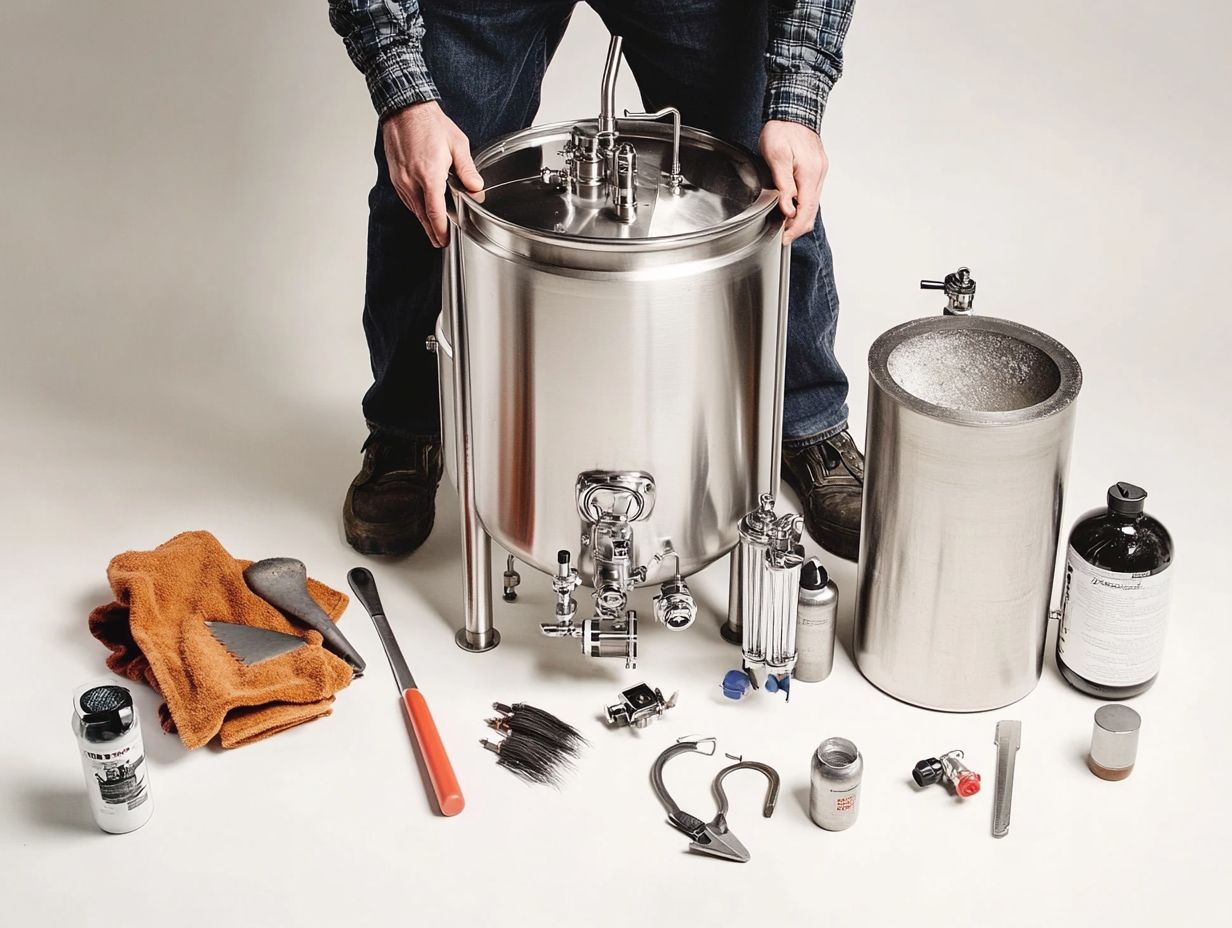
Off-flavors in beer can arise from a variety of factors, often tied to insufficient equipment maintenance during the brewing process. These unwelcome flavors may be the result of contamination, poor sanitation, or utilizing worn-out brewing tools. All of these can undermine the overall quality of your beer and detract from your brewing experience.
Regular equipment inspection is vital to maintain brewing quality. By tackling maintenance tasks and adhering to proper brewing techniques, you can considerably lower the risk of off-flavors and elevate your brewing endeavors.
Regularly cleaning and sanitizing your equipment is essential for preventing various off-flavors. For example, diacetyl can lend a buttery taste, while acetaldehyde is notorious for its green apple aroma. Embracing brewing safety protocols and cultivating a robust understanding of brewing principles will benefit your brewery immensely, helping you achieve brewing improvements.
Engaging with the brewing community opens up a treasure trove of insights. Sharing knowledge about maintenance tips can lead to marked improvements in your overall production.
By prioritizing these practices, you not only protect your creations from undesirable flavors but also contribute to a culture of excellence within the craft brewing industry.
Don’t let contamination ruin your batch! Act now to ensure your next brew is the best it can be!
3. Equipment Malfunctions
Equipment malfunctions are a common headache in home brewing, capable of derailing your entire operation if not managed effectively. You might find issues cropping up from neglected maintenance of essential brewing tools like pumps, heat exchangers, or fermentation tanks, leading to costly downtime and unexpected brewing expenses. By establishing a solid maintenance plan, you can mitigate these risks and ensure that your brewing process runs smoothly while preserving quality. Regularly checking the pump connection and pressure gauge is crucial.
In the brewing industry, every component is vital for achieving consistency and meeting those brewing standards. Just think about it: a malfunctioning pump can throw a wrench in the flow of ingredients, which may result in uneven temperatures or fermentation problems. Similarly, leaks in your fermentation tanks can lead to contamination or loss of product, which is the last thing you want. Proactive maintenance and using a brewing consultant for guidance can help avoid these issues.
Implementing preventive maintenance strategies like conducting regular inspections and making timely repairs can significantly boost your brewing efficiency and reduce the chances of unexpected breakdowns. By prioritizing these maintenance practices, you can enhance your overall brewing performance, minimize disruptions, and foster improvements that contribute to a more reliable final product. This ensures your brewery maintains high brewing quality.
How Can You Extend the Lifespan of Your Home Brewing Equipment?
Extending the lifespan of your home brewing equipment is crucial for ensuring consistent brewing quality and reducing replacement costs over time. To achieve this, it s essential to establish proper cleaning and sanitizing practices as part of your regular maintenance routine. This practice is important for maintaining your brewing equipment and brewing system.
Additionally, conducting maintenance checks at scheduled intervals enables you to detect potential issues early, preserving the effectiveness and integrity of your essential brewing tools and systems. By taking these proactive steps, you ll not only enhance your brewing experience but also safeguard your investment for years to come. Consider seeking brewing advice from experts in the brewing industry.
1. Proper Cleaning and Sanitizing
Proper cleaning and sanitizing are essential for maintaining the integrity of your brewing equipment and extending its lifespan. By diligently cleaning your fermentation tanks, brewing kettles, and other brewing tools, you can prevent the buildup that leads to contamination or off-flavors in your beer. Utilizing effective sanitization methods ensures that all surfaces are free from microbes, thereby safeguarding the quality of your brewing process. This practice is essential for successful beer fermentation.
Adopting a systematic approach to cleaning can make a significant difference. Begin by using hot water and a brush to scrub your equipment, making sure to reach every corner and crevice. Cleaning equipment regularly is vital for maintaining brewing quality.
It s wise to opt for a non-foaming caustic cleaner for your kettles and tanks, as this type of product effectively removes organic material without leaving behind pesky residues. In terms of sanitization, consider a no-rinse sanitizer, which simplifies the process and guarantees thorough coverage. Clean-in-place systems can also be used to ensure thorough cleaning.
Keep in mind that clean tools not only enhance the taste of your brews but also prevent cross-contamination between batches. These methods are essential for any brewer striving for excellence. Proactive maintenance and proper storage also contribute to the longevity of your brewing equipment.
2. Regular Maintenance Checks
Regular maintenance checks are essential for identifying potential issues before they escalate into significant problems with your brewing equipment. By scheduling routine inspections of equipment such as pumps, heat exchangers, and fermentation tanks, you can monitor wear and tear and implement necessary preventive maintenance steps. This proactive approach enhances brewing quality and ensures safety throughout the brewing process. Routine equipment inspection is a key aspect of brewery maintenance.
The frequency of these checks can vary based on the type of equipment and its usage. For instance, daily inspections may be vital for high-volume systems, while monthly or quarterly checks might suffice for smaller setups. Establishing a routine that includes a thorough examination of critical components like valves and filters will extend the lifespan of your machinery and improve overall product quality by reducing the risk of contamination. Inspections of safety valves and pressure gauges should also be part of your routine.
Embracing a culture of systematic maintenance allows your brewing operations to run smoothly. This focus on safety ensures your equipment remains in top condition.
3. Proper Storage
Proper storage of your home brewing equipment is essential for preventing damage and extending its lifespan. By keeping your brewing tools in a clean, dry environment, you protect them from dust, moisture, and other contaminants that could compromise their functionality. Incorporating smart storage solutions into your maintenance plan helps maintain the quality of your brewing tools, ensuring a more enjoyable brewing experience. Proper storage also safeguards your investment in brewery equipment.
For those passionate about brewing, understanding best practices for storage can significantly impact the quality of your brews. Avoid exposing your equipment to extreme temperatures, as fluctuating heat can degrade materials over time. Using designated containers for specific tools not only enhances organization but also prevents accidental damage. Prioritizing regular checks and cleanliness will bolster your overall brewing expertise and ensure brewing safety.
By integrating these storage techniques, you re not just safeguarding your investments; you re also paving the way for brewing improvements that come from having well-maintained equipment and adhering to brewing standards.
What Are Some Tips for Troubleshooting Home Brewing Equipment Issues?
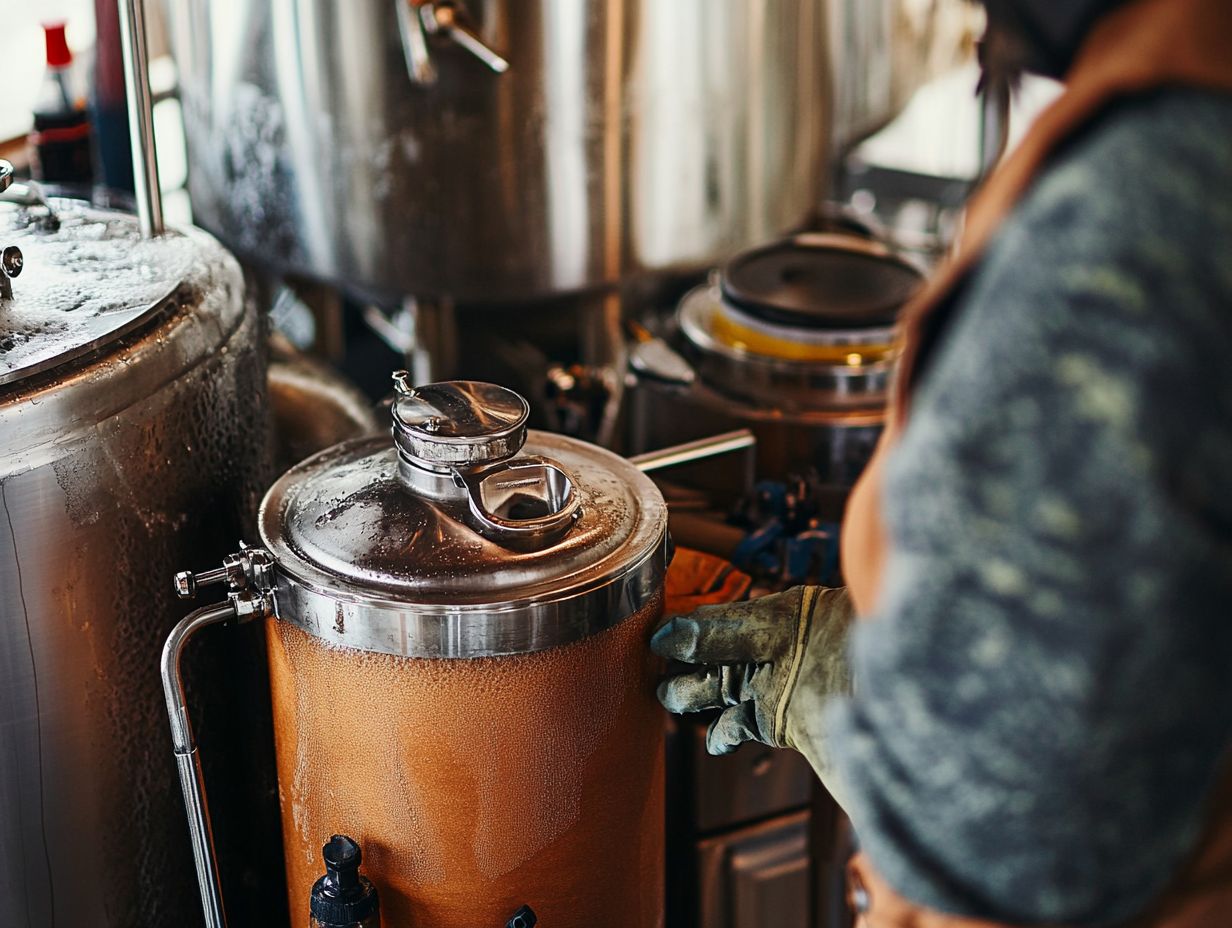
Troubleshooting issues with your home brewing equipment demands a keen awareness of common problems and effective strategies to tackle them. By familiarizing yourself with the symptoms of potential malfunctions like leaks or inconsistent temperatures you can swiftly diagnose and resolve these issues, ensuring your brewing process remains uninterrupted, supported by regular equipment inspection.
Adopting a systematic approach to troubleshooting enriches your brewing experience and safeguards the integrity of your valuable brewing tools, such as the brewing kettle and fermentation tank.
Frequently Asked Questions
What is home brewing equipment maintenance?
Home brewing equipment maintenance means taking care of your gear through regular cleaning and checks. It s crucial for quality brewing.
Why is home brewing equipment maintenance important?
Proper maintenance of home brewing equipment ensures that your beer is brewed safely and with consistent quality. It also extends the lifespan of your equipment, saving you money in the long run. Regular maintenance can enhance brewing quality and efficiency.
How often should I clean my home brewing equipment?
It is recommended to clean your equipment after every use to prevent any bacteria or contaminants from affecting the taste and quality of your beer. Consistent cleaning is a key component of preventive maintenance.
In conclusion, taking care of your brewing equipment is vital for ensuring high-quality results. Don t wait for issues to arise; act now to keep your brewing equipment in prime condition!
What products should I use for cleaning my home brewing equipment?
There are various cleaning solutions specifically made for home brewing equipment, such as PBW and Oxiclean. You can also use a mixture of hot water and a mild dish soap.
For more thorough cleaning, consider using Clean-in-place systems (CIP), which allow you to clean your equipment without disassembly.
How do I properly sanitize my home brewing equipment?
Don t skip this step! Use a food-grade sanitizer like Star San or iodophor immediately after cleaning to ensure your equipment is safe. Follow the manufacturer’s instructions for proper dilution and contact time.
Proper sanitation is crucial for brewing safety.
When should I replace my home brewing equipment?
Keep your brewing process top-notch! If you see wear and tear, it s time to replace your equipment. Look out for cracks, rust, or broken parts.
It is also recommended to replace certain pieces, like plastic tubing, after a certain number of uses for safety reasons. Regular equipment inspection can help identify when replacements are needed.

